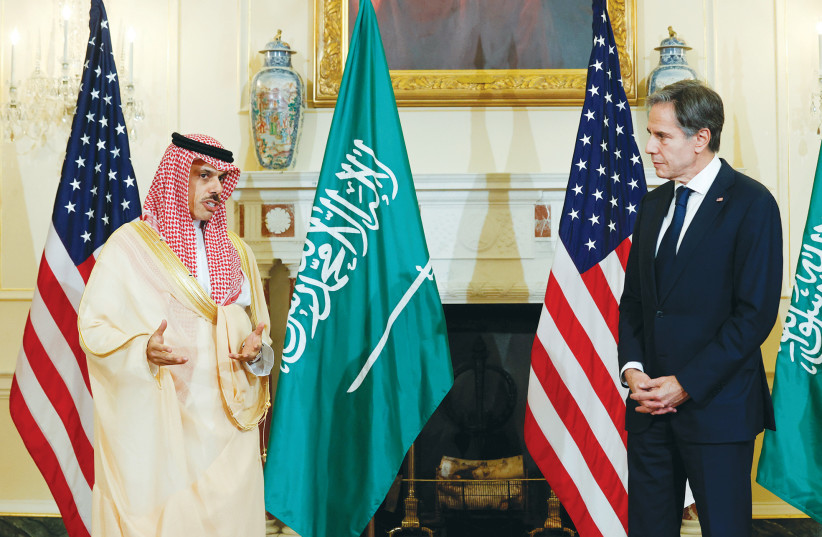Israeli-Saudi normalization has limited benefits without a two-state resolution, the country’s Foreign Minister Prince Faisal bin Farhan said, explaining that Riyad could support such a deal at the right time.
“We believe that normalization [with Israel] is in the interest of the region, that it would bring significant benefits to all,” he told reporters during a joint press conference with US Secretary of State Antony Blinken in Riyadh where the two diplomates discuss the possibility of such a deal.
Prince Faisal “Without finding a pathway to peace for the Palestinian people, without addressing that challenge, any normalization will have limited benefits,”
“Therefore, I think we should continue to focus on finding a pathway towards a two-state solution, on finding a pathway towards giving the Palestinians dignity and justice,” he explained.
Blinken said regional integration and de-escalation were key to the region’s stability and prosperity. “The Gulf is more connected than ever – both as a region and with countries in the broader Middle East, including Israel. The United States will continue to play an integral role in deepening and expanding normalization,” Blinken said.

Such a deal, however, is heavily dependent on an arrangement between Riyadh and Washington. Riyadh would like Washington’s support for its plans to build a nuclear plan to be part of that deal.
“It’s no secret that we are developing our domestic, civilian nuclear program,” Prince Faisal told reporters.
“We have differences of opinion, so we’re working on finding a mechanism for us to be able to work together on civilian nuclear technology,” Prince Faisal said as he emphasized that his country would move forward with or without US support.
Riyad and Washington ties are strong
The relationship between Riyad and Washington is strong, Prince Faisal said adding that such ties did not rule out other strong relationships such as those his country has with China, which is its second-largest trading partner.
“I think we are all capable of having multiple partnerships and multiple engagements, and the US does the same in many instances,” Faisal said.
Blinken dismissed the idea that China’s growing role in the region was the result of the Biden administration’s waning influence there.
“We’re not asking anyone to choose between the United States and China,” Blinken said emphasizing that the US remains the number one partner of choice for countries in the region.
While in Riyadh Blinken called Prime Minister Benjamin Netanyahu to update him on efforts toward a Saudi deal and to discuss Iran and the Palestinians.
Blinken reminded Netanyahu that the US expects Israel to uphold the commitments it made at the two regional summits held this year in Aqaba and Sharm el-Sheikh and spoke to him of the importance of refraining from unilateral measures that would “undermine the prospects for a two-state solution.”
The two men also discussed Iran’s push to develop nuclear weapons, with Netanyahu warning Blinken about the dangers of reviving the defunct 2015 Iranian nuclear deal. It was designed to curb Iran’s nuclear program but Israel has long believed that it strengthenedTehran’s push to produce atomic bombs.
Netanyahu “reiterated his consistent position that returning to the nuclear agreement with Iran would not stop the Iranian nuclear program and that no arrangement with Iran will obligate Israel, which will do everything to defend itself,” the Prime Minister’s Office explained.
